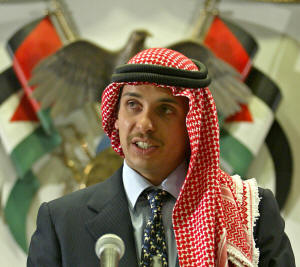Jordan's Prince Hamza defies the military in new recording
 Send a link to a friend
Send a link to a friend
 [April 05, 2021]
By Suleiman Al-Khalidi [April 05, 2021]
By Suleiman Al-Khalidi
Amman (Reuters) - Jordan's estranged Prince
Hamza said in a voice recording released on Monday that he would disobey
orders by the army not to communicate with the outside world after he
was put under house arrest and accused of trying to destabilise the
country.
The half-brother of King Abdullah and former heir to the throne said in
the recording released by the country's opposition that he would not
comply after being barred from any activity and told to keep quiet.
While Prince Hamza is not seen as a direct threat to the king, his
actions suggest he is keen to shore up his position with ordinary
Jordanians after he was removed from the royal succession.
"For sure I won't obey when they tell you that you cannot go out or
tweet or reach out to people but are only allowed to see the family. I
expect this talk is not acceptable in any way," he said in the recording
he circulated to friends and contacts.
On Saturday the military warned the prince over actions it said were
undermining "security and stability" in Jordan. Prince Hamza later said
he was under house arrest. Several high-profile figures were also
detained.

"The situation is difficult ... and the chief of staff came to me
warning me and I taped his words and distributed it to friends abroad
and my family in case something happens and now I am waiting to see what
they will do," Hamza said in the recording, which appeared shortly after
the visit by the head of the armed forces.
Officials announced on Sunday that Prince Hamza had liaised with people
who had contacts with foreign parties in a plot to destabilise Jordan
and he had been under investigation for some time.
The intrigue is likely to shake Jordan's image as a haven of stability
in the unpredictable Middle East.
It is unclear why the kingdom decided to crack down on Prince Hamza now,
but he put himself at growing risk by stepping up visits in recent weeks
to tribal gatherings where the king and his government have been
criticised more openly.
Public anger has also increased since nine COVID-19 patients died when
oxygen ran out in a newly built state hospital, exposing negligence
blamed on official mismanagement and corruption. Protests were broken up
with tear gas, further fuelling tensions.
A populist, Hamza went to the homes of those killed to pay condolences
in an attempt to upstage the monarch who had earlier gone to the
hospital to defuse anger, officials say.
Officials said efforts were underway to resolve the crisis within the
royal family, the first such open rift in many years, but Prince Hamza
was not cooperative.
[to top of second column]
|

Jordan's Crown Prince Hamza bin Hussein delivers a speech to Muslim
clerics and scholars at the opening ceremony of a religious
conference at the Islamic Al al-Bayet University in Amman, Jordan
August 21, 2004. REUTERS/Ali Jarekji/File Photo

King Abdullah removed Prince Hamza from his position as heir to the
throne in 2004, in a move that consolidated his power.
In a video passed to the BBC by his lawyer on Saturday, Prince Hamza
accused Jordan's leaders of corruption, in an apparent attempt to
tap into the public's frustrations.
Prince Hamza is not seen as a threat to the monarchy, which enjoys
the full support of the army and security services but has gained
sympathy among Jordanians sceptical of the government's accusations
about his foreign links, saying it was a campaign to defame him.
"This is character assassination without evidence," said Ali R. al
Tarawneh in a tweet.
Others felt he was only driven by revenge at being sidelined after
he was sacked as heir to the throne and was trying to win popularity
in tribal gatherings by emulating in tone and language his late
father, who is revered by many of his countrymen.
His wife, Queen Noor, had groomed him as a future king.
Prince Hamza angered the royal palace by his efforts to endear
himself to a poor tribal constituency that has in recent years felt
the impact of a shrinking economy and the inability of the state to
continue to create state jobs that have long absorbed tribesmen in
rural and Bedouin areas.

Officials said between 14 and 16 people had been arrested in
connection with the plot.
The state news agency said on Saturday that Bassem Awadallah, a
U.S.-educated confidant of the king who later became minister of
finance and adviser to Saudi Crown Prince Mohammed bin Salman, and
royal family member Sharif Hassan Ben Zaid were among those
detained.
Jordan's neighbours and allies expressed solidarity with King
Abdullah over the security measures in the kingdom, an important
ally of the United States.
(Writing by Michael Georgy; Editing by Giles Elgood)
[© 2021 Thomson Reuters. All rights
reserved.] Copyright 2021 Reuters. All rights reserved. This material may not be published,
broadcast, rewritten or redistributed.
Thompson Reuters is solely responsible for this content. |